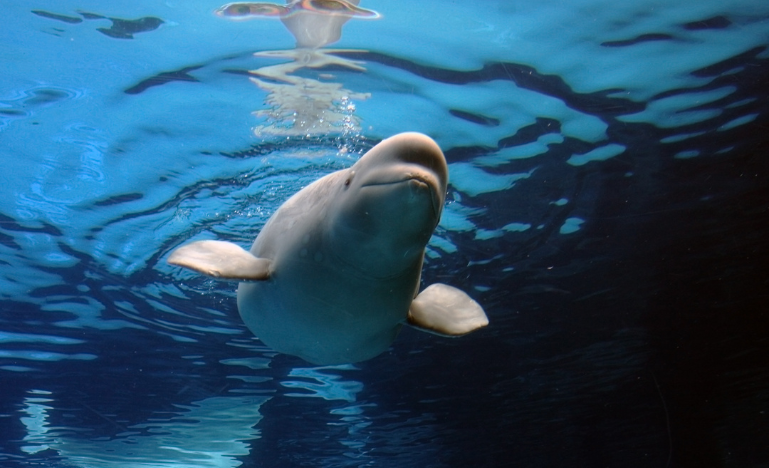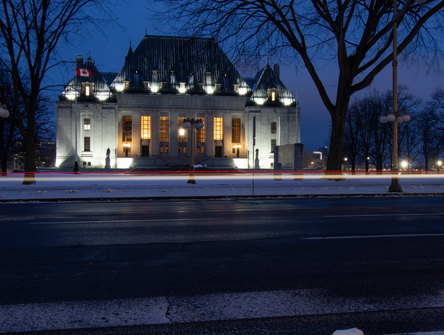Animal lawyers call on Ontario to protect Marineland’s belugas
The PAWS Act gives the provincial government power to intervene and ensure the 30 captive whales aren’t euthanized

Animal lawyers are urging the Ontario government to use its power under the Provincial Animal Welfare Services Act (PAWS) to intervene and protect 30 beluga whales at Marineland who could potentially be on death row.
Earlier this month, in a letter to federal Fisheries Minister Joanne Thompson, the Niagara Falls theme park said it is in “a critical financial state” and “running out of resources to provide adequate care for the whales.” If the federal government does not come forward with operating funds to care for the whales until a suitable relocation can be found, Marineland said it may have to make the “devastating decision of euthanasia.”
The letter came days after Thompson denied the park’s request for export permits that would have allowed the whales to be sent to Chimelong Ocean Kingdom in China.
By law, a federal permit is required to export the whales, and it must be for scientific research purposes or a move that is in their best interest. Thompson found sending these whales to China was not in their best interest and said in a statement she could not "in good conscience" approve the request because it would have meant “a continued life in captivity and a return to public entertainment.”
"Like many of you, I am angered that these whales have lived a life of captivity and as a result their health has deteriorated,” she said.
“Canadians expect me to act in the best interest of the whales. Under difficult circumstances with regrettable outcomes, that is what I have done."
A legal and moral obligation
Lawyers and animal advocates are now calling on the provincial government to take action.
“The province has very extensive authority under the PAWS Act to go in and care for the whales in the short term and protect them from being euthanized by Marineland,” says Camille Labchuk, an animal rights lawyer and the executive director of Animal Justice.
“It can seize the whales, it can keep them on site, it can send them somewhere else. It can do whatever it decides is necessary to relieve the stress that they might be experiencing. And the best part is that they can make Marineland pay for all of that.”
Section 15 of the PAWS Act prohibits causing distress to an animal and prohibits owners or custodians from allowing them to be in distress.
In addition to its legal obligation, the province has a moral obligation to intervene in cases of animal distress, says Victoria Shroff, K.C., who has practiced animal law for over 20 years in Vancouver and is the author of Canadian Animal Law.
She says distress includes psychological suffering, and it’s long been evident that whales at Marineland are experiencing this.
“Time and time again over the years, there’s been the drone footage of these poor marine mammals, circling in their tanks. They are clearly suffering from atypical behaviour and emotional distress.”
Experts say any attempt to kill the belugas en masse would undoubtedly lead to more.
In a letter to Ontario Solicitor General Michael Kerzner, who is responsible for implementing the PAWS Act, a group of cetacean specialists, veterinarians, and researchers from across Canada and beyond with extensive experience in the care, biology, and welfare of marine mammals, make clear that belugas are highly intelligent and emotionally sophisticated animals who become highly stressed when their social group is disturbed. They also grieve.
“Significant scientific evidence indicates that if the beluga whales at Marineland are killed, it will become evident to those animals in the other tanks,” the specialists said, as the whales are currently housed in two tanks.
“The relatives and friends of the belugas being killed will become highly agitated and distressed. As such, the process of killing all 30 animals would cause fear and profound psychological suffering across the population, which would be prolonged as each whale is left to wait their turn to be subjected to a fatal injection. This simply cannot be justified on any sound basis.”
In addition to it being ethically unacceptable to euthanize whales that are no longer profitable for Marineland, Animal Justice says it would also likely be illegal under sections 445 and 445.1 of the Criminal Code, given the unnecessary suffering it would cause, as well as section 15 of the PAWS Act.
The animal law advocacy group has filed a complaint with the Niagara Regional Police Service, calling for an investigation to prevent a mass killing.
Sentient, but still property
However, the reality is that animals, including intelligent, social, sentient beings like whales, are still treated as property in Canada — and as their owner, the park can legally do what it sees fit.
“Marineland’s belugas are complex, living sentient beings with intrinsic worth, but legally, they are considered property, and that's a flawed framework,” Shroff says.
“Animal rights are not intrinsic in this country. They’re contingent on human ownership. Because these animals are owned, that’s why Marineland is proceeding this way.”
Labchuk says members of the public are often surprised to hear that the legal system still treats animals as property.
“I think it’s high time that we moved towards some other model of protection and care, rather than giving property owners absolute rights over the lives of the animals that they care for and, in many cases, the lives of the animals that they exploit.”
Interestingly, the export permit process has introduced a bit of a novel test under Canadian law, as whales can only be sent outside the country if it’s in their best interest.
“I think it shows that we've started to look at these animals not just as items of property, but as individuals with interests, and we've shown some degree of respect for those interests,” Labchuk says.
“So maybe this is a good case for people to start having that discussion.”
Death and distress
Since late 2019, 19 belugas have died at Marineland, as has a dolphin and the park’s lone orca, Kiska.
Inspectors with the province’s Animal Welfare Services have visited the park more than 200 times since 2020, and in 2021, found its marine mammals were “in distress” due to poor water quality and ordered the water system to be fixed.
Speaking out this week, a former Marineland trainer said the water system breaks down regularly and the beluga pools are in desperate need of repair.
In 2024, the park was found guilty of violating Ontario’s animal cruelty laws relating to its care of three young bears, who were forced to live in cramped quarters with little access to water for months. It was later ordered to pay nearly $85,000 for failing to improve their living conditions.
Marineland was also criminally charged in 2021 for allegedly holding illegal dolphin shows. The Crown prosecutor later stayed the charge, insisting a trial wasn’t in the public interest, despite video evidence of the marine mammal performances, which were banned in Canada in 2019. That’s when, after a more than four-year-long swim through Parliament, the Ending the Captivity of Whales and Dolphins Act became law, making it a criminal offence to keep whales, dolphins, or porpoises in captivity in this country.
The legislation included a grandfather clause for animals already in facilities like Marineland, but banned breeding and the trade of reproductive materials.
Labchuk says the park, which didn’t open this summer, should have seen the writing on the wall when that legislation passed and planned for the day when it would close and the whales would have to be re-homed.
“Instead, Marineland failed to provide or set aside funds for their care and refuses to chat productively with organizations like the Whale Sanctuary Project that are in a position to help.”
Seeking sanctuary
At this point, Labchuk hopes the threat of euthanizing the belugas is a move to engineer a crisis and extort taxpayers, despite having likely made millions from its whale operations over the years and the fact that it’s sitting on millions more worth of property.
Marineland did not respond to a request for comment, but this week told the Niagara Falls Review it is working with Canada's Accredited Zoos and Aquariums (CAZA) and its American counterpart, the Association of Zoos and Aquariums (AZA), on a possible rescue plan for the whales.
In a statement, the CAZA and AZA said: “Together, we are exploring a coordinated rescue effort to enable the safe transfer of as many animals as possible into accredited facilities, ensuring they receive immediate professional care and lifelong welfare.”
The Whale Sanctuary Project has been working for years to create a safe ocean environment in Nova Scotia that captive cetaceans can move to. Project CEO Charles Vinick says all environmental assessments and required studies have been completed and submitted to the appropriate agencies. At this point, they’re waiting for provincial approval of a Crown Lands lease. Having worked with community partners to move this forward, he’s hoping it will come very soon.
In the meantime, Vinick, who led the effort to return Keiko to the wild, as captured in the film Free Willy, says the Marineland belugas need to have independent health assessments to determine what is best for each of them. All concerned parties, including government officials, Marineland, the Whale Sanctuary Project, NGOs, and zoo and aquarium leaders, need to come together and collectively identify all possible opportunities to rehome each whale.
Once the lease comes through, Vinck says the Project’s focus will be on raising the funds to fabricate and install the sanctuary’s nets and infrastructure.
“By the summer, we can then welcome as many of the belugas as possible. Yes, there is a lot to do, but this is a remarkable time for the promise of the legislation passed in 2019 to result in a Canadian whale sanctuary to save some Canadian whales. It would be remarkable if we could find the ways and the will to all collaborate to make it happen,” he says.
“Sanctuary is the solution the public is demanding when these laws are passed.”
In recent weeks, others have come forward to float the idea of giving the belugas a home, including the mayor of Burgeo in Newfoundland and Labrador.
Focussed on Ford
For now, public pressure is focused on the Ontario government, urging it to act. Last month Premier Doug Ford said the province will "do whatever it takes" to give the belugas at Marineland "the best life possible."
What it plans to do remains unclear, however. Despite repeated requests to the Ministry of the Solicitor General, National received no response to its questions.
“Premier Ford needs to realize whether he likes it or not, Ontario has primary jurisdiction over captive wildlife within the province's borders,” Colin Saravanamuttoo, executive director of World Animal Protection Canada, said in a statement.
“This game of chicken between Marineland, the province and Ottawa is totally unacceptable. Premier Ford needs to step up, lead and stop passing the buck.”
Shroff agrees.
“We’re in a situation where we need the PAWS Act to intervene, and we need Doug Ford to get up there on his platform and be a hero for these belugas.”


